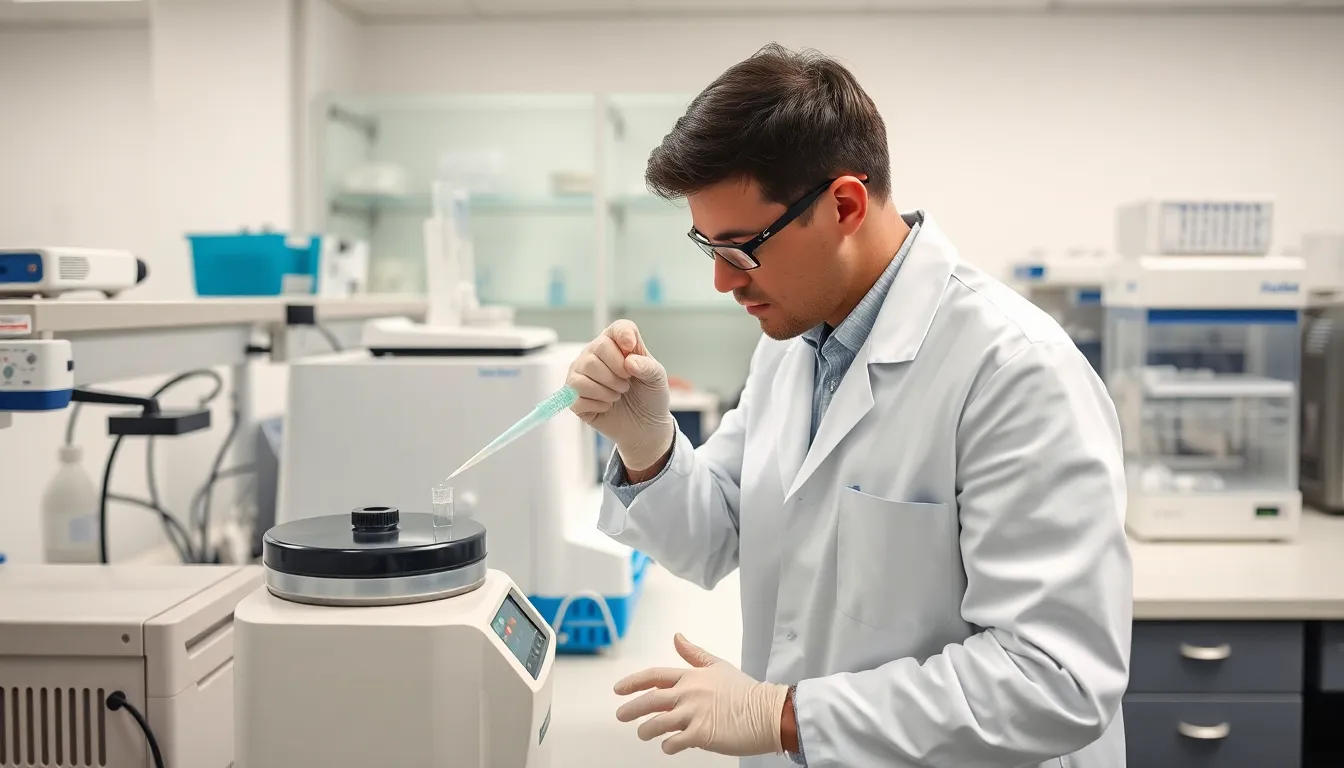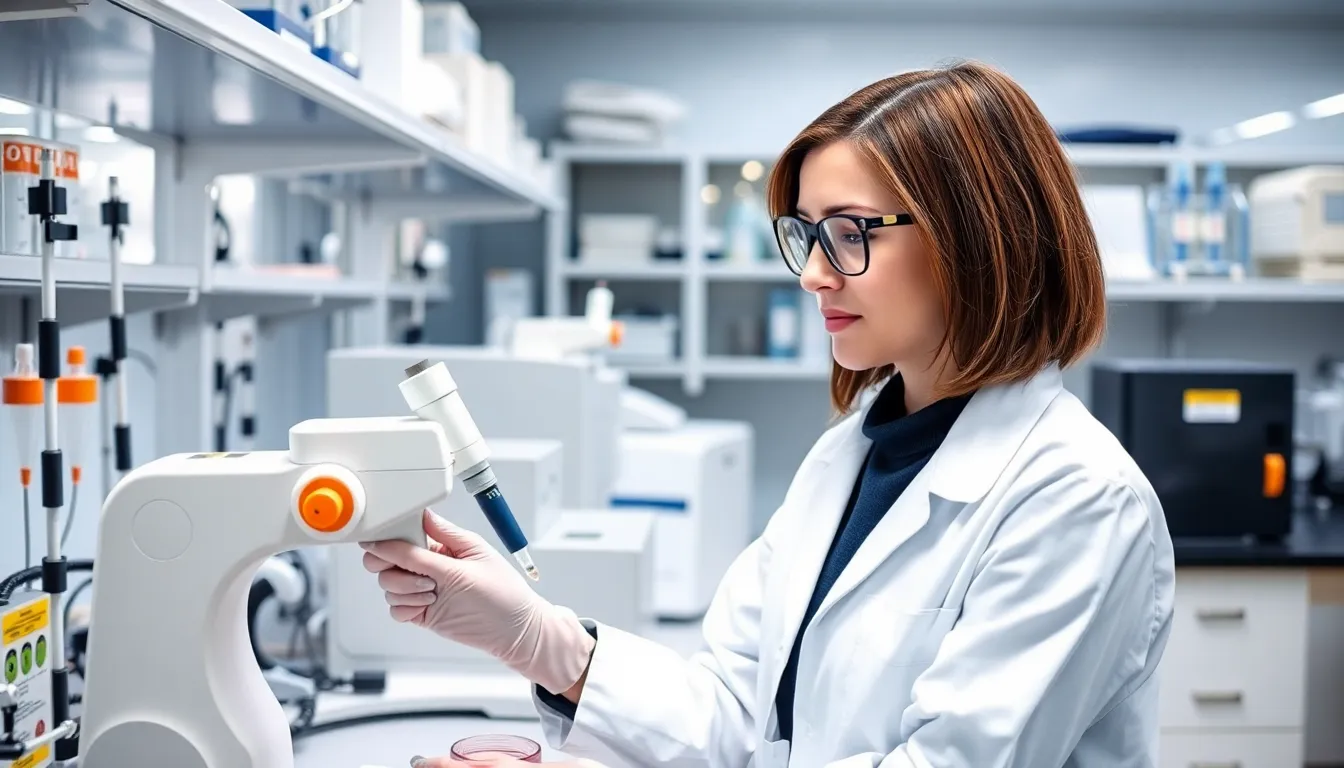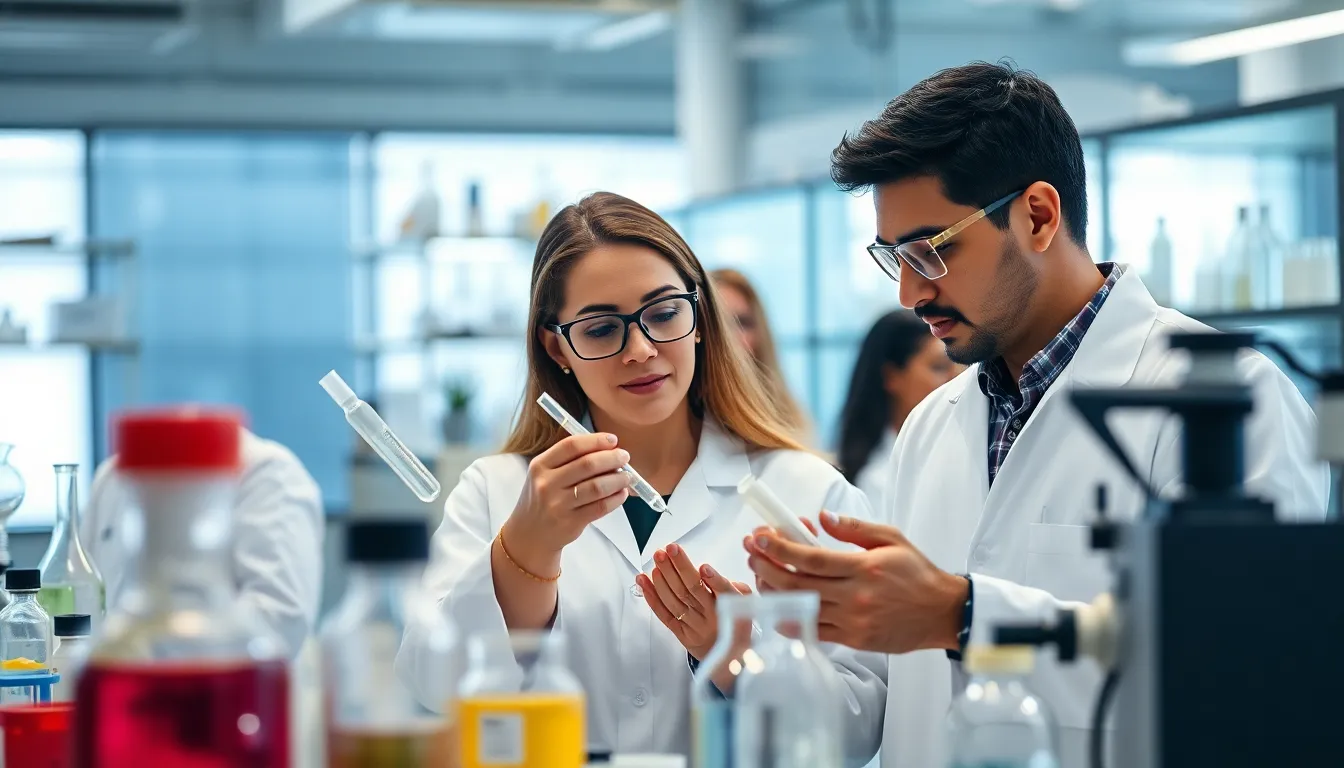In the fast-paced world of biotech, having the right equipment is like having a superhero cape—essential for soaring to new heights. Whether it’s precision pipettes or cutting-edge incubators, the right tools can turn a lab into a wonderland of discovery. Who wouldn’t want to mix a little science with a dash of magic?
Table of Contents
ToggleOverview of Biotech Equipment
Essential equipment forms the backbone of biotechnology research. Laboratories utilize various tools to facilitate research, including precision pipettes, which deliver accurate liquid measurements essential for experiments. Advanced incubators provide controlled environments for cell growth, maintaining optimal conditions for biological processes.
Biotech equipment ranges from basic tools to sophisticated devices. Centrifuges separate components in solutions, allowing researchers to isolate specific materials. Spectrophotometers measure light absorbance, helping in the analysis of nucleic acids and proteins.
Automation in biotech labs enhances efficiency. Robotic pipetting systems accelerate repetitive tasks, freeing researchers for more complex activities. High-throughput screening equipment allows for testing multiple samples simultaneously, improving discovery rates for new compounds.
Safety equipment also plays a critical role. Biohazard cabinets protect researchers from exposure to potentially harmful biological agents. Personal protective equipment, such as lab coats and gloves, ensures safety during experiments.
Storage solutions for samples and reagents contribute to research integrity. Refrigerators maintain samples at low temperatures, while freezers store long-term specimens. Proper storage prevents contamination and preserves sample viability for future analyses.
Understanding the capabilities and limitations of various biotech equipment fosters innovation. Researchers select tools that align with their specific experiments, creating a synergy that drives scientific progress. This targeted approach maximizes research outcomes, enabling significant breakthroughs in the field.
Types of Biotech Equipment

Numerous types of biotech equipment support research, each serving a unique purpose. Below are the primary categories essential for various applications in the field.
Laboratory Equipment
Laboratory equipment includes precision tools crucial for conducting experiments. Pipettes aid in accurate liquid measurements, while centrifuges separate components based on density. Spectrophotometers analyze nucleic acids and proteins, providing vital data for research. Incubators create controlled environments for cell culture and microbial growth. Autoclaves maintain sterility by eliminating contaminants. Furthermore, imaging systems visualize cellular structures, enhancing understanding of biological processes. The combination of these instruments fosters innovative research and efficient workflows.
Field Equipment
Field equipment is designed for on-site research, crucial for collecting samples in natural environments. Portable DNA sequencers enable rapid genetic analysis directly in the field. Water quality testers measure pH, temperature, and contaminants, ensuring environmental safety. Soil sampling kits provide insights into nutrient levels and microbial activity. Additionally, mobile labs offer flexible workspaces equipped with essential tools for immediate analysis. This equipment supports researchers in obtaining data relevant to biodiversity and ecological studies, enhancing overall scientific knowledge.
Key Features of Biotech Equipment
Biotech equipment showcases essential features that enhance research capabilities. Precision and accuracy play a fundamental role, as they ensure experimental results are reliable and reproducible.
Precision and Accuracy
Translating into real-world applications, precision pipettes deliver exact volumes of liquid, minimizing variability across tests. Centrifuges effectively separate components based on density, guaranteeing the purity of samples. Spectrophotometers provide reliable measurements for nucleic acids and protein concentrations, enabling scientists to validate their experimental designs. Incorporating these tools leads to higher confidence in results, which is critical in advancing biotech discoveries. Accuracy in measurements ensures that insights derived from data reflect true biological phenomena, fostering innovation and understanding.
Versatility and Adaptability
Biotech equipment also exhibits versatility and adaptability, accommodating a range of research needs. Advanced incubators support various cell types through adjustable environmental conditions, making them suitable for diverse experiments. Robotic pipetting systems enhance efficiency by allowing multiple liquid handling tasks simultaneously, perfect for high-throughput screening. Mobile labs serve as portable research platforms, enabling on-site data collection in ecological studies. Such adaptability supports researchers in tackling different challenges, accelerating the pace of scientific advancements. This flexibility, paired with precision, empowers researchers to conduct groundbreaking experiments across a variety of applications.
Leading Brands in Biotech Equipment
Several brands lead the biotech equipment market, each recognized for quality and innovation. Thermo Fisher Scientific provides a wide range of laboratory equipment, including pipettes and centrifuges. Their commitment to precision positions them as a top choice for researchers.
Agilent Technologies, known for its analytical instruments, offers cutting-edge spectrophotometers and chromatography systems. The reliability and accuracy of their products make them indispensable for many laboratories.
PerkinElmer specializes in imaging systems and detection solutions, catering to diverse biotech applications. Their advanced solutions enhance research through improved visualization capabilities.
Eppendorf focuses on liquid handling products and is renowned for its high-performance pipettes. Their tools promote accuracy, which is crucial for successful experimental outcomes.
Bio-Rad Laboratories stands out for its emphasis on quality reagents and instruments, particularly in molecular biology. They provide essential tools for measuring nucleic acids and proteins, supporting a wide range of scientific inquiries.
Beckman Coulter offers equipment for both clinical and research environments, with centrifuges and automated systems designed to improve operational efficiency. Their advanced technology helps streamline experiments, enhancing overall productivity.
Bringing automation into labs, companies like Hamilton Company develop robotic liquid handling systems. Their innovations significantly increase throughput and reduce human error in experiments.
Each of these brands contributes to advancing biotechnology with equipment that meets rigorous research standards. Their diverse offerings provide essential support for laboratories exploring new frontiers in science.
Future Trends in Biotech Equipment
Emerging technologies are reshaping biotech equipment, driving innovation across laboratories and fields. Robotics and automation enhance efficiency, enabling labs to process samples and data much faster. Smart equipment, like AI-integrated systems, improves decision-making by analyzing complex datasets in real time. Increased connectivity through the Internet of Things (IoT) allows devices to communicate, streamlining processes and providing data access from remote locations.
Sustainability also plays a significant role in future developments. Manufacturers are focusing on environmentally friendly materials and energy-efficient designs, helping reduce the ecological impact of biotechnology. New, compact models, such as miniaturized lab instruments, facilitate field research without sacrificing performance. Advanced storage solutions aim to minimize energy consumption, protecting samples while adhering to sustainability practices.
In addition, personalization in biotech equipment is gaining traction. Customized solutions, tailored to specific research needs, increase experimental efficiency. As a result, researchers can achieve more accurate results and enhance experimental outcomes. These shifts in customization reflect the growing demand for specialized tools in diverse applications.
Integration of data management software is another future trend. This software optimizes workflow and ensures compliance with regulatory standards. Systems that incorporate cloud storage allow real-time collaboration among researchers, facilitating knowledge sharing and accelerating discoveries.
In sum, these evolving trends demonstrate a commitment to advancing biotech research through enhanced technology, sustainability, and customization. The industry’s trajectory highlights an ongoing dedication to improving both equipment functionality and research outcomes.
The role of biotech equipment in research cannot be overstated. It’s the foundation that supports innovation and discovery in the field. With advancements in technology and a focus on precision and efficiency, researchers are better equipped than ever to tackle complex scientific challenges.
Emerging technologies like automation and smart equipment are reshaping laboratories, enabling faster data processing and improved decision-making. The commitment to sustainability and customization further enhances the capabilities of this essential equipment.
As the biotech landscape continues to evolve, staying informed about the latest tools and trends will empower researchers to push boundaries and achieve remarkable breakthroughs.




